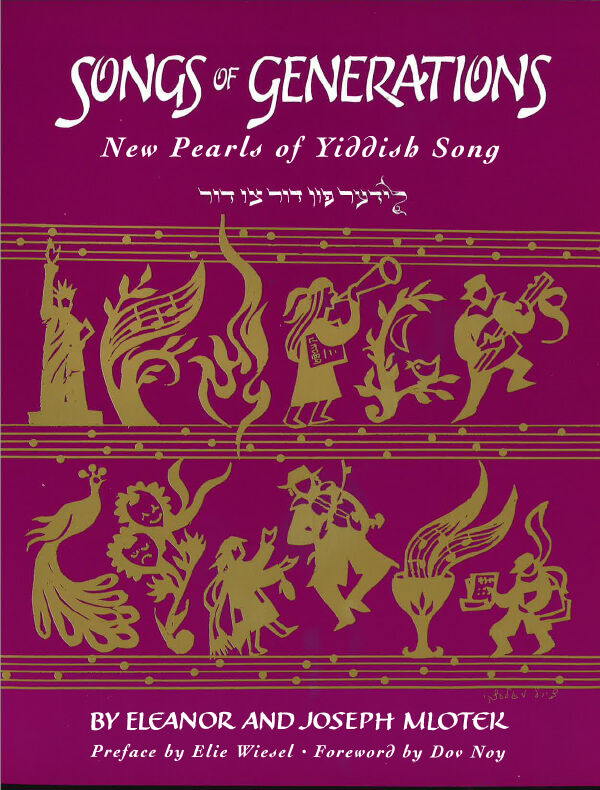Song published in Songs and Scenes of Bialystok Ghetto. (N.Y., Feborn 7, 1948). The text was also published by Shmerke Kaczerginski who attributes the words to I. Zukerman or H. Goldstein of the Bialystok Ghetto. Markovtshizlne is a village, 10 kilometers from Bialystok, where Jews were led for forced labor. The Bialystok Jews called the German officer Aletsky from Posen “Mesh” (Copper) because he had red hair. At first they called him “Meshener kop”(Copper Head), later they shortened the name to “Meshl.”

I am a Markovtshizner, I know it well,
Naked and barefoot, I cool my blood.
“Cursed one,” they yell at me and my heart aches.
Harried, driven, left with nothing but blows and yells.
Work diligently, but make it fast,
From red-headed “Copper” you receive your pay
a dog’s life, without meaning or purpose –
Markovtshizner, it’s a sad game.
I had a father and mother, oy vey,
and sisters and brothers, too.
I’ve been left lonely as a stone,
these days I sit a work and gnash my teeth.
I had a wife, faithful as a dear mother,
and my little children were like two diamonds.
Parted so suddenly, parted with force,
I will never forget your bright faces.
My mother suffocated from crowding in the field.
My other near ones sent to the next world.
So I must toil with brick and mortar,
driven from my home, home is now prison.
Prison is my home, a horrible nest.
Blows and screams, food fit for pigs.
Early to work, and late back home,
and we ask one another, what will become of us?
One fate for everyone, one struggle for all,
we must live as brothers,
but when one brother is hungry, where is his conscience?
Markovtshizne, too, is sad.
A markovtshizner bin ikh, dos fil ikh gut.
Naket un borves di fis — ikh farkil mayn blut.
“Farflukhter” — shrayt men oyf mir un s’harts tut mir vey,
Geyogt mikh, getribn, bay gornisht geblibn, nor klep un geshrey.
Refrain:
Arbet flaysik, ober shneler makh es bald,
Fun Meshlen dem geln bakumstu dayn gehalt.
A hintish lebn on inhalt, on tsil —
Markovtshizne, a troyerike shpil.
lkh hob gehat a tatn, a mamen, oy-vey,
Shvester-brider oykh derbay.
Geblibn bin ikh elnt vi a shteyn,
Haynt zits ikh bay der arbet un krits di tseyn.
lkh hob gehat a froy, vi a mamenyu getray,
Kinderlekh mayne — vi brilyantn tsvey.
Tsesheydt azoy plutslung, tsesheydt mit gevald,
lkh vel keyn mol nit fargesn ayer likhtik geshtalt.
Di mame fun engshaft oyfn feld zikh dershtikt,
Di iberike nonte oyf yener velt geshikt.
Derfar muz ikh horeven bay tsigl un leym,
Fun shtub mikh fartribn, di tfise mayn heym.
Di tfise mayn heym, a shreklekhe nest.
Klep un geshreyen un khazershe kest.
Gants fri bay der arbet un shpet tsurik aheym,
Un eyner fregt dem tsveytn: vos vet fun undz zayn?
Far ale eyn goyrl, far ale eyn shtrebn,
Azoy vi brider darfn mir lebn,
Ober ven es hungert eyn bruder-dayn gevisn iz vu?
Troyerik iz markovtshizne nokh dertsu.
אַ מאַרקאַװטשיזנער בין איך, דאָס פֿיל איך גוט,
נאַקעט און באָרװעס די פֿיס־איך פֿאַרקיל מײַן בלוט.
„פֿאַרפֿלוכטער“ — שרײַט מען אױף מיר און ס’האַרץ טוט
מיר װײ,
געיאָגט מיך, געטריבן, בײַ גאָרנישט געבליבן, נאָר קלעפּ און געשרײ.
רעפֿרײן:
אַרבעט פֿלײַסיק, אָבער שנעלער מאַך עס באַלד,
פֿון מעשלען דעם געלן באַקומסטו דײַן געהאַלט.
אַ הינטיש לעבן אָן אינהאַלט, אָן ציל —
מאַרקאָװטשיזנע, אַ טרױעריקע שפּיל.
איך האָב געהאַט אַ טאַטן, אַ מאַמען, אױ־װײ,
שװעסטער־ברידער אױך דערבײַ.
געבליבן בין איך עלנט װי אַ שטײן,
הײַנט זיץ איך בײַ דער אַרבעט און קריץ די צײן.
איך האָב געהאַט אַ פֿרױ װי אַ מאַמעניו געטרײַ,
קינדערלעך מײַנע — װי בריליאַנטן צװײ.
צעשײדט אַזױ פּלוצלונג, צעשײדט מיט געװאַלד,
איך װעל קײן מאָל ניט פֿאַרגעסן אײַער ליכטיק געשטאַלט.
די מאַמע פֿון ענגשאַפֿט אױפֿן פֿעלד זיך דערשטיקט,
די איבעריקע נאָנטע אױף יענער װעלט געשיקט.
דערפֿאַר מוז איך האָרעװען בײַ ציגל און לײם,
פֿון שטוב מיך פֿאַרטריבן, די תּפֿיסה מײַן הײם.
די תּפֿיסה, מײַן הײם, אַ שרעקלעכע נעסט,
קלעפּ און געשרײען און חזירשע קעסט.
גאַנץ פֿרי בײַ דער אַרבעט און שפּעט צוריק אַהײם,
און אײנער פֿרעגט דעם צװײטן: װאָס װעט פֿון אונדז זײַן?
פֿאַר אַלע אײן גורל, פֿאַר אַלע אײן שטרעבן,
אַזױ װי ברידער דאַרפֿן מיר לעבן,
אָבער װען עס הונגערט אײן ברודער־־דײַן געװיסן איז װוּ?
טרױעריק איז מאַרקאָװטשיזנע נאָך דערצו.
Song Title: Lid Fun Byalistoker Geto

The Songs of Generations: New Pearls of Yiddish Song anthology comprises songs that were either never printed before or appeared in rare and inaccessible publications — sometimes in different versions and without proper sources. Most of the songs in this book were submitted by readers of Chana and Yosl’s column “Perl fun der yidisher poezye” (Pearls of Yiddish Poetry) in the Yiddish newspaper Der Forverts (The Forward), initiated in October, 1970. Over 25 years, thousands of songs were collected in correspondence and on cassettes from readers throughout the world, and they represent a veritable national Yiddish song archive. Chana Mlotek, in her introduction, writes, “In the course of years the inquiries, contributions and enthusiasm of these readers have kept our own interest unflagging and have reinforced our dedication to this effort. And in recent years our participants have also been augmented by new readers from the former Soviet Russia, who receive our newspaper there or from newly-arrived immigrants in this country and Israel.”